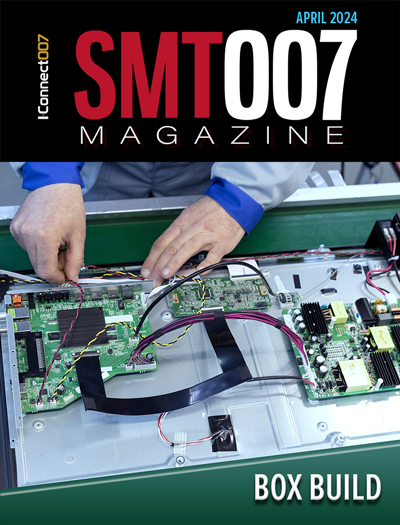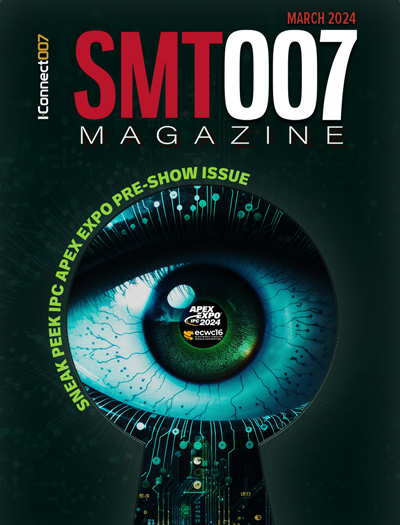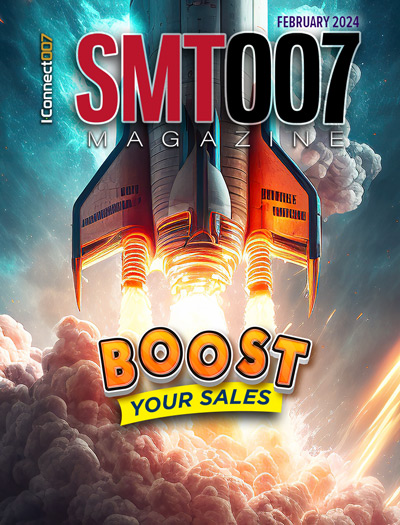-

- News
- Books
Featured Books
- smt007 Magazine
Latest Issues
Current Issue
Box Build
One trend is to add box build and final assembly to your product offering. In this issue, we explore the opportunities and risks of adding system assembly to your service portfolio.

IPC APEX EXPO 2024 Pre-show
This month’s issue devotes its pages to a comprehensive preview of the IPC APEX EXPO 2024 event. Whether your role is technical or business, if you're new-to-the-industry or seasoned veteran, you'll find value throughout this program.

Boost Your Sales
Every part of your business can be evaluated as a process, including your sales funnel. Optimizing your selling process requires a coordinated effort between marketing and sales. In this issue, industry experts in marketing and sales offer their best advice on how to boost your sales efforts.
- Articles
- Columns
Search Console
- Links
- Events
||| MENU - smt007 Magazine
Michael Kottke: Growing With Greenfield Sites
March 1, 2023 | Nolan Johnson, I-Connect007Estimated reading time: 3 minutes
Nolan Johnson: Michael, as a growing EMS provider, what’s most on your mind these days?
Michael Kottke: If you look at our agenda, and ask about what markets we are supporting, you’ll see we’re doing a lot of stuff in space, as well as high-end networking, and high-end computing. We’re seeing a lot of security-driven devices. Who knew that China could be a security risk? I’ve been shocked at how often I’m approached about building product in the U.S.—product that they used to build in China or Taiwan. We’re seeing the more complicated, more traceability- and more process-driven stuff, so that’s what we’re going after. With all that, I think we’ll have another good growth year.
Johnson: A while ago, you mentioned that there was a regional rather than global geographic effect as well.
Kottke: I’m surprised at how many people want to do business in [Rocket EMS’s] Carson City [Nevada facility] as a cost-savings measure.?The cost savings from here in San Jose to Carson is significant;?the building is one-fifth the cost, power is 30–35% cheaper, and as you go down the list, you’ll find that almost everything is cheaper on the overhead side.
The labor is a little bit cheaper, but because of the way that Carson City will be structured, we’ll have most of the expensive overhead here in San Jose. Carson City will be more of a production facility that relies heavily on automation as well as reduced overhead to achieve a very attractive cost model for our customers. I’m shocked at how many people are interested in moving business from here in California to Nevada.
Johnson:?You’re talking about having more complex work coming into your facility. Is that something that you are actively pursuing with sales and marketing?
Kottke: I actually don’t have a marketing team or a sales team. Currently, we get about one new customer request a week, and we’re probably only taking on one or two a month. If we wanted, we could get 10 new customers a month, but we want to be careful about where we’re putting our resources for customers. A lot of prospective customers want engineering support alongside program management support; some customers have a difficult time paying for all that extra work. We have great resources that enable us to take on those high-maintenance customers, the kind of people who don’t have good systems or tools and need that kind of hand-holding—those are great customers, provided they have the budget to pay for those additional services.
Johnson: Am I correct in presuming that part of your ability to move into these higher complexities is because of the business operations software that you’ve developed at Rocket EMS over the years?
Kottke: Yeah, we are continuing to make significant investments in automation and systems. The Voyager software team has tripled in size over the last two years and the resulting capabilities and data collection power probably close 90% of the customers when we have a customer come through for a tour. If they get the Voyager demo, it’s a “close the deal” kind of scenario. Every three months or so there are major revision changes to it, and at least once a month we have a list of updates and improvements. The Voyager software has gotten so good. Now that we have the engineering guys, production, and the quality group working closely with the Voyager team, we’re generating very specific reports and tools. That move has improved efficiency by a crazy amount; it’s mind boggling.
Johnson: Add that to the other efficiencies in operation in Carson, Nevada, and your operations really start to change.
Kottke: In 2023, we will be investing in systems and automation capital equipment. If everything goes correctly, that building will have two to three times the capacity of Santa Clara and probably 50 to 60% of the personnel.?That changes my cost model; it changes what business I go after; it changes everything.
This is an excerpt from the February 2023 issue of SMT007 Magazine, click to continue reading this conversation.
Suggested Items
KIC’s Miles Moreau to Present Profiling Basics and Best Practices at SMTA Wisconsin Chapter PCBA Profile Workshop
01/25/2024 | KICKIC, a renowned pioneer in thermal process and temperature measurement solutions for electronics manufacturing, announces that Miles Moreau, General Manager, will be a featured speaker at the SMTA Wisconsin Chapter In-Person PCBA Profile Workshop.
The Drive Toward UHDI and Substrates
09/20/2023 | I-Connect007 Editorial TeamPanasonic’s Darren Hitchcock spoke with the I-Connect007 Editorial Team on the complexities of moving toward ultra HDI manufacturing. As we learn in this conversation, the number of shifting constraints relative to traditional PCB fabrication is quite large and can sometimes conflict with each other.
Standard Of Excellence: The Products of the Future
09/19/2023 | Anaya Vardya -- Column: Standard of ExcellenceIn my last column, I discussed cutting-edge innovations in printed circuit board technology, focusing on innovative trends in ultra HDI, embedded passives and components, green PCBs, and advanced substrate materials. This month, I’m following up with the products these new PCB technologies are destined for. Why do we need all these new technologies?
Experience ViTrox's State-of-the-Art Offerings at SMTA Guadalajara 2023 Presented by Sales Channel Partner—SMTo Engineering
09/18/2023 | ViTroxViTrox, which aims to be the world’s most trusted technology company, is excited to announce that our trusted Sales Channel Partner (SCP) in Mexico, SMTo Engineering, S.A. de C.V., will be participating in SMTA Guadalajara Expo & Tech Forum. They will be exhibiting in Booth #911 from the 25th to the 26th of October 2023, at the Expo Guadalajara in Jalisco, Mexico.
Intel Unveils Industry-Leading Glass Substrates to Meet Demand for More Powerful Compute
09/18/2023 | IntelIntel announced one of the industry’s first glass substrates for next-generation advanced packaging, planned for the latter part of this decade.


